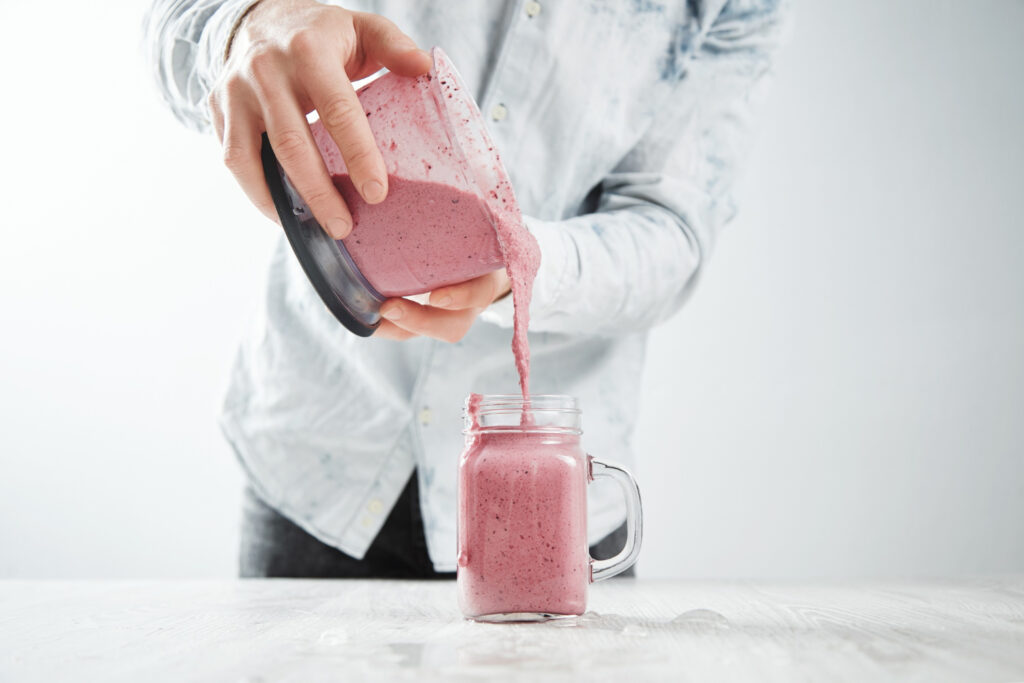
In this article
Drinking smoothies is an effortless and tasty way to boost your intake of nutritious foods such as fruits and vegetables. Incorporating a source of protein into your smoothies not only enhances their nutritional value but also makes them more filling and stabilizes blood sugar levels.
Protein sources like yogurt and seeds slow down digestion, thereby reducing the speed at which sugar is absorbed into your bloodstream. This not only helps you feel fuller for longer but also supports various bodily functions such as immune defense and muscle growth. Ensuring you meet your daily protein needs is crucial for optimal health.
1. Greek Yogurt
Greek yogurt, with its creamy texture and tangy flavor, is a fantastic protein-rich addition to any smoothie. It contains more than twice the protein found in regular yogurt. An 8-ounce serving of Greek yogurt offers 22.7 grams of protein, compared to just 11.9 grams in the same amount of regular yogurt. Add it to fruit-based smoothies, especially those made with berries or frozen peaches, for a delicious and nutritious treat.
2. Chia Seeds
Chia seeds are nutrient powerhouses, packed with omega-3 fatty acids, fiber, calcium, magnesium, phosphorus, and manganese. They are also a good source of plant-based protein, providing 4.7 grams per ounce. These seeds can be added to any smoothie, whether fruit-based or green. However, be sure to drink your smoothie soon after making it, as chia seeds thicken and take on a gel-like consistency when mixed with liquid.
3. Peanut Butter
Peanut butter is a popular and tasty addition to smoothies. It pairs well with a variety of ingredients, particularly cacao, blueberries, and cinnamon. With approximately 7 grams of protein per 2 tablespoons, peanut butter is an excellent choice for those looking to increase their protein intake.
4. Hemp Seeds
Hemp seeds are surprisingly rich in protein, offering 9.48 grams per 3 tablespoons. Incorporating them into your smoothies can help you meet your daily protein requirements while also boosting your intake of essential nutrients like magnesium, zinc, and healthy fats. Hemp seeds add a slightly sweet, nutty flavor and creamy texture to smoothies.
5. Almond Butter
For those who prefer an alternative to peanut butter, almond butter is a delicious and nutritious option. It is also safe for people with peanut allergies if processed in a peanut-free facility. Almond butter contains 6.72 grams of protein per 2 tablespoons. Try blending it with frozen cherries and Greek yogurt for a sweet and creamy smoothie.
6. Cottage Cheese
Cottage cheese is a high-protein dairy product that can be enjoyed on its own or added to smoothies for a protein boost. A 1-cup serving provides 24 grams of protein and 17% of your daily calcium needs. This makes it an excellent choice for supporting bone health, muscle function, and various other vital processes.
7. Kefir
Kefir, a fermented yogurt drink, is another excellent source of protein, providing 9.21 grams per cup. It not only boosts your smoothie’s protein content but also supports gut health with probiotics such as Lactobacillus, Lactococcus, and Streptococcus species. These probiotics promote overall digestive health.
8. Milk
Using milk as the liquid base for your smoothies is a simple way to increase their protein content. One cup of 2% milk offers 8.23 grams of protein and essential nutrients like calcium, zinc, and B12. Its mild taste makes it a versatile addition to both fruit and vegetable-based smoothies.
9. Tofu
Tofu is a high-protein soy product, providing 8.67 grams per 3-ounce serving. It is an excellent option for plant-based diets, adding protein to various dishes, including smoothies. Tofu is low in carbohydrates and high in vitamins and minerals such as calcium, zinc, selenium, and iron, making it a nutritious smoothie ingredient.
10. Cashew Butter
Cashew butter, another nut butter option, offers 5.64 grams of protein per 2 tablespoons. It is also rich in zinc and magnesium. Its creamy, slightly sweet flavor makes it a delightful addition to chocolate-based smoothies, such as those made with chocolate-flavored protein powder or cacao.
11. Collagen Powder
Collagen powder is a versatile protein source that can be used in both hot and cold beverages, including smoothies. Most collagen peptide powders provide around 10 grams of protein per 11-gram serving. Unflavored collagen peptides can boost the protein content of any smoothie combination, whether fruit or vegetable-based. Regularly consuming collagen supplements can benefit the health of your bones, joints, and skin.
12. Pumpkin Seeds
Pumpkin seeds are one of the most protein-dense seeds, offering 8.45 grams per ounce. They are also an excellent source of magnesium, covering 37% of your daily needs per 1-ounce serving. Magnesium is crucial for regulating blood sugar and blood pressure, making pumpkin seeds a smart addition to smoothies for those with conditions like hypertension and diabetes.
13. Chickpeas
While chickpeas are typically used in savory dishes like soups and curries, they can also add a creamy texture to smoothies along with a hearty dose of plant-based protein and fiber. A 1-cup serving of cooked chickpeas provides 14.5 grams of protein and 12.5 grams of fiber. This combination helps you feel full longer, aiding in weight management. Try blending cooked chickpeas with sweet smoothie ingredients like berries, cinnamon, and bananas.
14. High-Protein Oats
Regular oats provide about 10.7 grams of protein per cup, but some varieties are even higher in protein. For instance, Bob’s Red Mill Protein Oats contain 50% more protein than regular oats, packing nearly 30 grams per cup. These oats, made from specially bred plants, are a great choice for those aiming to increase their protein intake. You can add oats directly to your smoothie or soak them in water beforehand for a smoother consistency.
15. Ricotta Cheese
Ricotta cheese is another creamy, high-protein dairy product, with 18.5 grams of protein per cup. It is also rich in calcium, selenium, and several B vitamins, making it a valuable addition to boost the nutritional benefits of your smoothies.
16. Sunflower Seeds
Sunflower seeds, though small, pack a punch in terms of nutrients, including vitamin E, a powerful antioxidant. A 1-ounce serving provides 5.47 grams of protein and 49% of your daily vitamin E needs. They can add a creamy texture to both fruit and vegetable-based smoothies.
17. High-Protein Plant Milks
Not all plant milks are created equal in terms of protein content. Soy milk and oat milk are among the highest, with soy milk providing 8.32 grams of protein per cup and oat milk offering 4 grams per cup. These plant milks can be used as a base in smoothies just like dairy milk.
18. Pasteurized Egg Whites and Egg White Powder
Egg whites are an excellent source of protein. Pasteurized egg whites and egg white powder can easily be added to smoothies. Egg white powder contains 21.3 grams of protein per one-quarter-cup serving, while the same amount of liquid egg whites offers 6.63 grams of protein.
Tips for Making Protein-Rich Smoothies
To make a perfect protein-rich smoothie, follow these steps:
- Start with 1.5 cups of frozen or fresh fruit, such as berries, a banana, or frozen peaches.
- Choose at least one protein source, like a cup of Greek yogurt, 2 tablespoons of peanut butter, or a scoop of collagen peptides.
- Add a liquid (one cup for every 1.5-2 cups of frozen fruit). Opt for a protein-rich liquid like soy milk or a hydrating option like coconut water.
- Include a few add-ins, such as high-protein seeds (pumpkin or chia) or other ingredients like cacao powder, fresh kale, or cinnamon.
- Blend your ingredients in a high-speed blender until your smoothie reaches the desired consistency.
By incorporating these protein-packed ingredients and following these tips, you can create delicious, nutritious, and satisfying smoothies that support your overall health
A Quick Review
Adding protein-rich foods to your smoothies can boost their nutritional value, make them more filling, and help stabilize blood sugar levels. Incorporate ingredients like Greek yogurt, chia seeds, peanut butter, hemp seeds, almond butter, cottage cheese, kefir, milk, tofu, and more to create delicious and protein-packed smoothies
FAQS
What are the best protein sources for smoothies?
Greek yogurt, chia seeds, peanut butter, hemp seeds, and almond butter are some of the best protein sources for smoothies.
Can I use plant-based proteins in my smoothies?
Yes, plant-based proteins like hemp seeds, chia seeds, and tofu are excellent additions to smoothies.
How much protein should I add to my smoothie?
Aim to add at least one protein source that provides around 7-20 grams of protein per serving to ensure your smoothie is nutritious and filling.
How can protein in smoothies benefit my health?
Protein in smoothies can help you feel full longer, stabilize blood sugar levels, support muscle growth, and aid in overall bodily functions.











